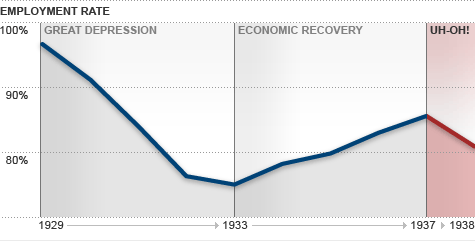
NEW YORK (CNNMoney.com) -- Congress will soon spar over how to spur jobs.
The basic question underlying the debate: Does the country need more stimulus?
The question comes as high unemployment continues to grip the economy and the effects of the $787 billion stimulus package start to fade.
Some economists advise lawmakers to do more -- now. Others say that is exactly the wrong way to go.
Framing the debate is the specter of 1937. That's when the economy, which had been in its fourth year of recovery from the Great Depression, fell out of bed all over again with a very loud and painful thud.
Between May 1937 and June 1938, employment fell 22%, factory output dropped 32% and stock prices plunged more than 40%.
More than 70 years later, economists still debate the primary causes of the 1937 recession. They typically point to one or more of the following as culprits:
Economists also debate the lessons 1937 holds for today's economy.
Everyone agrees that the economy has stepped back from the abyss it faced last year. But those calling for more stimulus say there is still a long way to go before it can stand on its own.
"The patient is out of surgery. But it's still in ICU and needs treatment," said William Gale, co-director of the Tax Policy Center.
Those pushing for more stimulus, like Nobel Prize-winning economist Paul Krugman, say policymakers should not make the same mistake as their 1930s predecessors: prematurely packing up their stimulus marbles and going home because they wrongly assumed the economy was out of the woods.
And the head of the International Monetary Fund recently warned that, since private sector demand remains weak, developed countries risk falling into recession again if they prematurely withdraw stimulus.
On the other side of the debate, stimulus critics believe the economy should be allowed an opportunity to self-correct before lawmakers inject any more stimulus.
It's time to let the private sector try and pull itself up by the bootstraps even though it will be slow-going, said Douglas Holtz-Eakin, a former director of the Congressional Budget Office who served as John McCain's top economic adviser during the 2008 presidential election.
Holtz-Eakin believes that the first stimulus did have some positive impact but that much of the package was poorly designed and inefficient.
To stimulus critics, the actions taken by the Federal Reserve, the Treasury and the FDIC since the fall of 2008 -- keeping interest rates low, providing liquidity in frozen markets and guaranteeing assets -- did more to pull the economy back from the ledge than many of the spending measures in stimulus.
Another argument stimulus critics make: The government can't spend its way out of recession.
"Every dollar Congress injects into the economy must first be taxed or borrowed out of the economy. No new spending power is created. It is merely redistributed from one group of people to another," wrote Brian Riedl, a senior policy analyst at the conservative Heritage Foundation, in a brief.
Economists can -- and will -- argue about the need for more stimulus until the cows come home.
But no matter what Congress decides, a recession could occur anyway, said Lakshman Achuthan, managing director of the Economic Cycle Research Institute.
"We're going to experience another recession sooner than anyone thinks. And it's likely to be before the economy has healed," Achuthan said.
That's because the pattern of postwar downturns has changed, he explained. Recessions are occurring more frequently because the expansions that follow them are growing shorter.
Going forward, the U.S. growth rate isn't expected to average more than 3% a year. So the economy won't be able to weather cyclical downturns worse than that without dipping into recession. And the volatility in economic cycles has also grown, meaning bigger swings up and down are more likely.
What's more, lawmakers can't alter the business cycle, Achuthan said. He notes, for instance, that the four years of recovery preceding the 1937 recession were "the poster child for expansion." Unemployment fell 3% a year on average, about six times today's norm, and the economy grew 10% a year.
But the recession happened anyway.
What lawmakers can do is soften the business cycle, but only if they get the timing right in terms of when to inject stimulus and when to withdraw it.
"Needing to do more isn't a complete answer," Achuthan said. "You also need to know when to stop." ![]()






| Index | Last | Change | % Change |
|---|---|---|---|
| Dow | 32,627.97 | -234.33 | -0.71% |
| Nasdaq | 13,215.24 | 99.07 | 0.76% |
| S&P 500 | 3,913.10 | -2.36 | -0.06% |
| Treasuries | 1.73 | 0.00 | 0.12% |
| Company | Price | Change | % Change |
|---|---|---|---|
| Ford Motor Co | 8.29 | 0.05 | 0.61% |
| Advanced Micro Devic... | 54.59 | 0.70 | 1.30% |
| Cisco Systems Inc | 47.49 | -2.44 | -4.89% |
| General Electric Co | 13.00 | -0.16 | -1.22% |
| Kraft Heinz Co | 27.84 | -2.20 | -7.32% |
|
Bankrupt toy retailer tells bankruptcy court it is looking at possibly reviving the Toys 'R' Us and Babies 'R' Us brands. More |
Land O'Lakes CEO Beth Ford charts her career path, from her first job to becoming the first openly gay CEO at a Fortune 500 company in an interview with CNN's Boss Files. More |
Honda and General Motors are creating a new generation of fully autonomous vehicles. More |
In 1998, Ntsiki Biyela won a scholarship to study wine making. Now she's about to launch her own brand. More |
Whether you hedge inflation or look for a return that outpaces inflation, here's how to prepare. More |